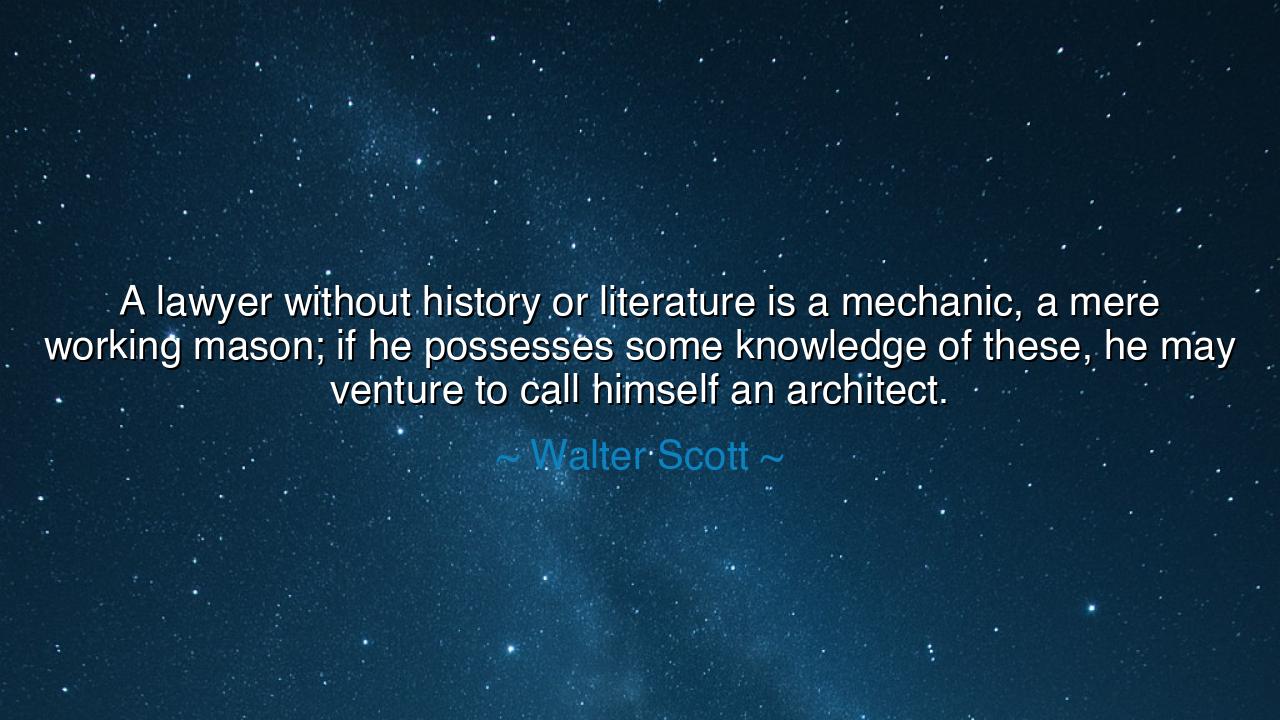
A lawyer without history or literature is a mechanic, a mere
A lawyer without history or literature is a mechanic, a mere working mason; if he possesses some knowledge of these, he may venture to call himself an architect.






The great Scottish novelist and historian Sir Walter Scott, whose pen breathed life into both the chivalry of the past and the spirit of his own age, once wrote: “A lawyer without history or literature is a mechanic, a mere working mason; if he possesses some knowledge of these, he may venture to call himself an architect.” In this statement, Scott spoke not only to lawyers, but to all who labor in the service of intellect and justice. He drew a line between mere function and true mastery, between one who works only with the tools of his trade and one who understands the soul of his craft. For Scott believed that knowledge without wisdom, and skill without imagination, are but the shadows of greatness — useful, perhaps, but lifeless.
The origin of this quote is rooted in Scott’s deep reverence for both law and literature. Before he became one of the most celebrated authors of his time, Scott was himself a lawyer — a man trained in the strict discipline of reason and precedent. Yet he also possessed the heart of a poet and the mind of a historian. He understood that to practice law without an understanding of humanity’s long story — its struggles, triumphs, and moral lessons — is to wield power without compassion. To him, history gave a lawyer perspective, and literature gave him empathy. Without these, a lawyer may build arguments, but he cannot build justice.
Scott’s metaphor is vivid and timeless. The mechanic, he says, performs the work of his hands — skillful, yes, but bound by routine. The mason builds walls, stone upon stone, without vision of the structure’s whole design. But the architect — he sees beyond the stone. He knows the history of his art, the purpose of his creation, and the beauty of proportion. Likewise, a lawyer who knows only statutes and codes works within the narrow confines of law; but one who understands history and literature perceives the living fabric of human experience that law is meant to serve. He becomes an architect of justice, shaping it not merely by rules, but by wisdom.
Consider the story of Abraham Lincoln, who, before leading his nation through its greatest trial, practiced law upon the frontier. He had no formal degree, yet he devoured books of history and poetry — Shakespeare, the Bible, and the great speeches of antiquity. When he stood before juries or later before the American people, he did not speak as a mere craftsman of legal argument. He spoke as one who understood the moral architecture of the human soul. His words, infused with the rhythm of literature and the lessons of history, built bridges between justice and mercy. It was this breadth of spirit — not mere technical skill — that made him not a mason of laws, but an architect of liberty.
Scott’s wisdom also reveals a universal truth about the nature of learning. To master any discipline — whether law, science, or art — one must look beyond its narrow boundaries. A doctor who reads only medicine may heal the body, but without philosophy, he cannot understand the spirit. A soldier who knows only warfare may win battles, but without history, he will not know what wars are worth fighting. So it is with the lawyer: if he reads only the statutes of his time, he becomes their prisoner. But if he studies the epic of mankind, he learns that justice is not static; it is a living tradition, carried forward by those who remember what has been and dream of what may yet be.
In the world of the ancients, this truth was well known. The philosophers of Greece, the orators of Rome, the scholars of the East — all were shaped by both law and literature, reason and imagination. Cicero, the Roman statesman and advocate, embodied this union perfectly. He spoke before courts with the precision of a jurist and the grandeur of a poet. He defended not only clients, but civilization itself — for he understood that to persuade men’s minds, one must first touch their hearts. Walter Scott, standing in the lineage of such men, sought to remind his own age that no profession is noble unless it serves the greater story of humanity.
Let this, then, be the lesson: do not confine your mind to the walls of your trade. Whether you are a lawyer, a teacher, an engineer, or an artist, learn to see beyond the stone in your hand. Study history, for it will show you where you come from; read literature, for it will teach you what it means to be human. Seek not only to build, but to understand what you are building and why. For the world has enough mechanics — what it needs are architects of vision, men and women whose craft is guided by conscience and imagination.
So, my children of this modern age, heed the wisdom of Sir Walter Scott: to know the law is good, but to know life is better. Let your mind be vast, your heart tender, your work inspired. Be not content to lay the stones of your craft — lift your eyes to the design of truth and beauty that lies above them. Then, and only then, will you not merely work within the world, but help to shape it.






AAdministratorAdministrator
Welcome, honored guests. Please leave a comment, we will respond soon